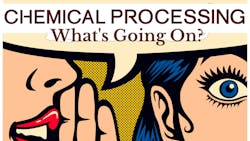Survey: Impact of Trump’s new tariffs on your business
Want to sound off on how the impact of Trump’s new tariffs will impact your facility? Chemical Processing’s parent company, Endeavor Business Media, is executing a six-question survey that will examine multiple industries. Geert De Lombaerde, EBM’s editor-at-large, will package up the results from the survey and offer an analysis.
We’re eager to understand how companies like yours are adapting and planning for the future. Share your thoughts now.
Editor’s note: Welcome to What’s Going On? This is a quick look at news impacting the chemical industry from the lens of outside sources, including our parent company Endeavor Business Media’s many brands.
The editors at IndustryWeek discussed opportunities and challenges related to President Trump’s latest tariffs. Executive Editor Jill Jusko points out that it’s the worst time to rely on firefighting as a strategy.
“Continuous improvement is going to play a role for manufacturers for whom these tariffs are an opportunity as well as for whom these tariffs are a crisis,” Jusko said.
She added: “It means building a robust maintenance and reliability program if you don’t have one. Why? Because spares may be hard to come by if you rely on overseas providers. If you are benefiting from the tariffs, you can’t have your equipment breaking down.”
Watch the Production Pulse roundtable for more thoughts on how to navigate tariffs.
Chemical & Engineering News reported that many chemicals were excluded from the Trump administration tariffs.
These products include polymers such as polyethylene, polypropylene, polyethylene terephthalate; petrochemicals like phenols and ethylene; and other large-volume chemicals such as titanium dioxide. The list also has exclusions for pharmaceutical products, semiconductors, and energy products. Some products on the exemption list may be subject to later tariffs.
The article also pointed out that chemical makers are worried about proposed ocean shipping rules that they believe could raise costs and disrupt commerce.
The U.S. Trade Representative (USTR) plans to impose a series of fees on international maritime shippers docking in U.S. ports.
In comments filed with the USTR, Nestor de Mattos, vice president of integrated supply chain at Dow, says the measures would add $65 million to $75 million to Dow’s costs annually, “in addition to the undetermined cost of highly disrupted import/export capability, capacity constraints, costly inland transportation congestion and complexity, and significant global supply chain disruption.”
Alex Cossin at WaterWorld discussed what the tariffs mean for the water industry. Some of that runs over into the chemical industry.
Utilities receive equipment, materials and chemicals from all over the world. This includes things like:
- Pipes
- Pumps
- Valves
- Membranes
- Chemical treatments
The tariffs will make importing these items more expensive for utilities. These increased costs could translate into higher utility rates and budget constraints.
Head over to WaterWorld for a full table of "reciprocal tariffs" displayed during Trump's speech.
Pharma Manufacturing’s Greg Slabodkin points out that the biopharma industry has made it through the first round of reciprocal tariffs … for now.
“We think impacts to biotech and pharma should be minimal because pharmaceuticals are exempted from the new tariffs,” Jefferies analysts wrote in a note to investors. “The President has mentioned [potential] for tariffs on pharmaceuticals/API which could come ‘at some point’.” But for now, they see “minimal impact to biopharma.”
Offshore magazine’s Managing Editor, Bruce Beaubouef, reports the recently enacted tariffs are expected to have some level of negative impact on the oil and gas industry in the U.S. Gulf of Mexico (GoM).
For producers in the U.S. GoM, Trump’s tariffs are, at the very least, adding uncertainty to an industry already navigating Biden-era leasing limits, pandemic-induced supply chain disruptions and a global energy transition.
The tariffs are expected to add 2-5% to overall project expenses in the US GoM, the result of higher steel and equipment costs, modest fuel price risks, and supply chain friction.
Curious why Offshore isn’t calling it the Gulf of America? Beaubouef explains it here.
About the Author
Traci Purdum
Editor-in-Chief
Traci Purdum, an award-winning business journalist with extensive experience covering manufacturing and management issues, is a graduate of the Kent State University School of Journalism and Mass Communication, Kent, Ohio, and an alumnus of the Wharton Seminar for Business Journalists, Wharton School of Business, University of Pennsylvania, Philadelphia.

